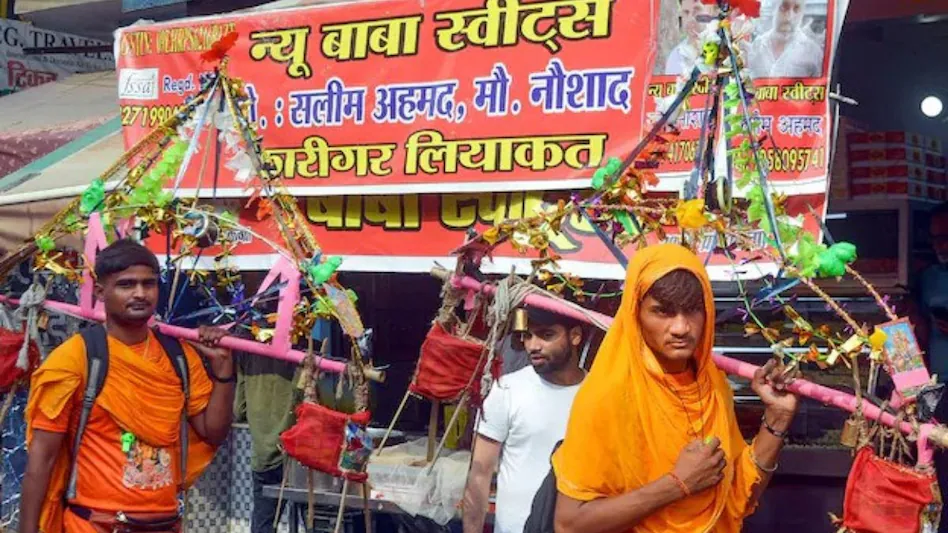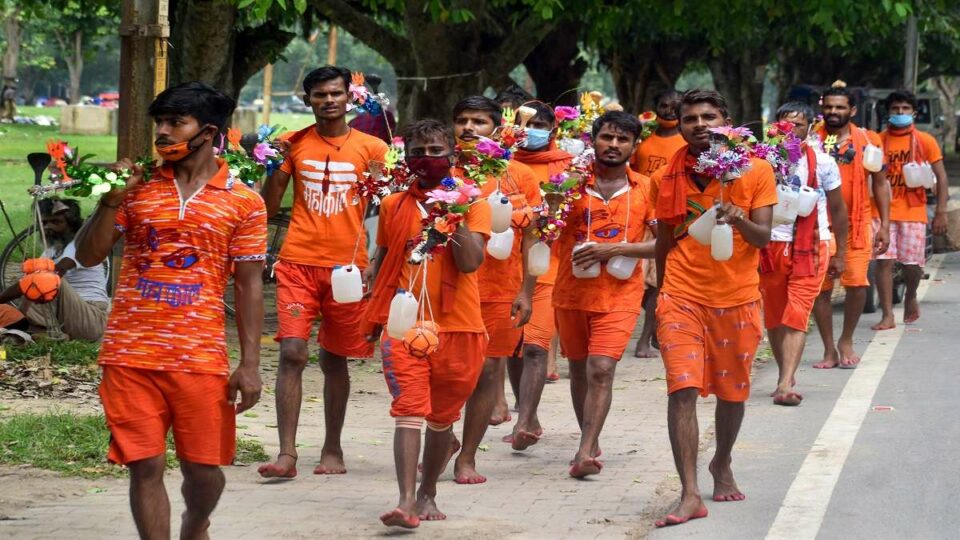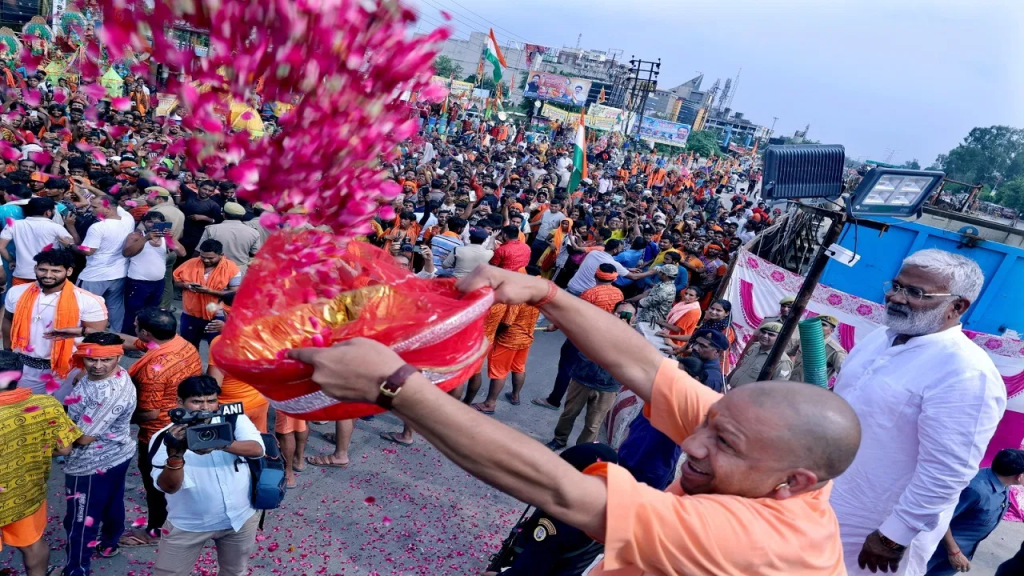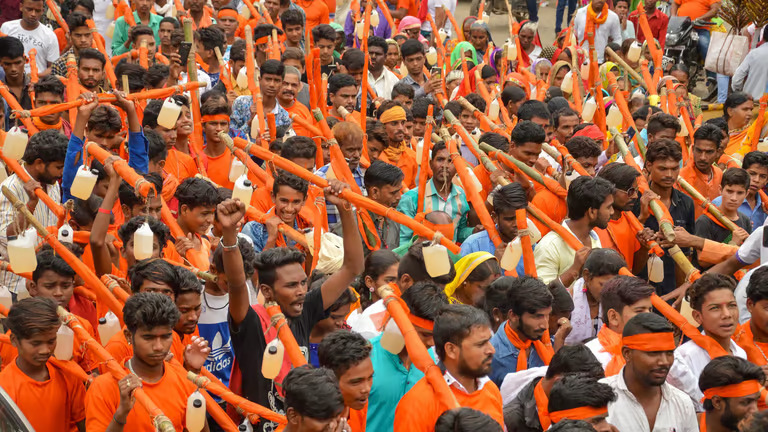The Apex Court’s striking down of the UP administration’s contentious directive requiring eateries on the Yatra route to display owner details has cast Yogi government in a poor light and given the opposition a leg up. A report by Mudit Mathur

While declining to entertain the last-minute reply filed by the Uttar Pradesh government that the direction to shops along the Kanwar Yatra route to display the names of owners was to ensure a peaceful pilgrimage, the Supreme Court on July 26 extended the interim stay order on directives issued by the Uttar Pradesh and Uttarakhand governments asking eateries along the Kanwariya pilgrim route to display the names of the owners and the staff. The stay order will continue to remain in force till August 5, the next hearing date.

The Supreme Court on Friday extended its interim stay order on directives issued by the Uttar Pradesh, Uttarakhand, and MP governments mandating the eateries along the Kanwar Yatra to display the names and identities of owners and staff.
A bench comprising Justices Hrishikesh Roy and SVN Bhatti was hearing the petitions filed by the Association for Protection of Civil Rights, TMC MP Mahua Moitra, Prof Apoorvan, and columnist Aakar Patel against the directives of the UP and Uttarakhand governments.
When the matter was taken up, Senior Advocate Dr Abhishek Manu Singhvi, appearing for Moitra, submitted that the Uttar Pradesh Government filed a counter-affidavit at 10:30 p.m. on 25 July and time was required to file a rejoinder. Stating that the counter-affidavit has not come on record, the bench agreed to adjourn the matter.

The Uttar Pradesh government has told the Supreme Court that its directive to the shops along the Kanwar Yatra route to display the names of owners was to ensure that the religious sentiments of Kanwariyas were not hurt, “even accidentally”, and also for “peace and tranquillity”. It further explained that the directive was issued in response to complaints received from Kanwariyas regarding confusion caused by the names of the shops and eateries.
“Past incidents have shown that misunderstandings regarding the type of food being sold have led to tensions and disturbances. The directives are a proactive measure to avoid such situations,” the government said. The state government added that the order doesn’t impose any ban on the trade or business of food sellers — barring restrictions on the sale of non-vegetarian food — and that shopkeepers are “free to conduct their business as usual”. The directive to display the names of owners is “merely an additional measure” to ensure transparency and keep any potential confusion at bay.

The apex court was also told that even “small confusions” related to the food Kanwariyas are served, have the potential to “hurt their religious sentiments and can lead to flare-ups, especially in a communally sensitive region like Muzaffarnagar.
“It is to be noted that the directive does not impose any discrimination based on religion, caste, or community. The requirement to display the names and identities of the owners applies uniformly to all food sellers along the Kanwar Yatra route, irrespective of their religious or community affiliations,” the UP government said. It added that the order was aimed at ensuring public safety and order during the Kanwar Yatra, considering the large number of participants in the pilgrimage. “It is imperative to take preventive measures that ensure a peaceful and harmonious pilgrimage,” the state government told the top court.
Senior Advocate Mukul Rohatgi, appearing for the State of Uttar Pradesh, submitted that the regulations under the Central law Food and Safety Standards Act, 2006 require every food seller, including dhabas, to display the owner’s names. The interim order passed by the Court, which stayed the directive to display the owners names, was not in line with this Central law, Rohatgi submitted, as it was not brought to its notice by the petitioners.
The bench however remarked that if there is any such law, then the State should be enforcing it throughout all areas. “Then let it be enforced all across…not only in certain areas. File a counter showing it has been enforced all over…” Justice Roy said.
Rohatgi requested for an early hearing of the matter, preferably next Monday or Tuesday, saying that the matter will otherwise become infructuous as the Kanwar yatra period will be over in two weeks. He added that the petitioners had the duty to inform the Court about the existence of such a law.
In response, Singhvi submitted that since there was no mandate to display owners’ names during the Kanwar pilgrimages of the last 60 years, there was no harm in allowing the yatra this year without the enforcement of such directions. He added that the UP Government has admitted in their affidavit that the direction was causing discrimination. Senior Advocates Chander Uday Singh and Huzefa Ahmadi also appeared for the petitioners.
Singhvi read out the following statement from the affidavit: “The temporary nature of the directives ensures that they do not inflict any permanent discrimination or hardship on the food sellers, simultaneously ensuring maintaining the sentiments of Kanwariyas and their religious beliefs and practices”. “So they say there is discrimination, but it is not permanent,” he submitted.
Deputy Advocate General of Uttarakhand, Jatinder Kumar Sethi, submitted that the law mandates the display of the owners’ names and that the interim order was creating problems. He stated that this legal mandate was being enforced by the State all over during all festivals. If an unregistered vendor causes any mischief along the Kanwar Yatra route, it will lead to law-and-order problems, he submitted. When the bench asked the Dy. AG to elaborate on what could be a “mischief”, he cited an example of an unregistered vendor selling mangoes laced with sedatives to the pilgrims.
The bench also heard the brief submissions made by certain Kanwar pilgrims, who intervened in the matter to support the government’s directions. The intervener submitted that Kanwar pilgrims only take vegetarian food items prepared without garlic and onion. There are certain shops with confusing names, giving a false impression that they serve only vegetarian food causing problems to the pilgrims, he submitted.
“There are shops with names like Saraswati Dhaba, Maa Durga Dhaba. We assume it is pure vegetarian. When we enter the shop, the owners and the employees are different, and non-vegetarian food items are served there. It is against my custom and usages,” he submitted. It was in this context that the Muzaffarnagar police issued the advisory to display the names “voluntarily”, he submitted.
The bench clarified that it has not prevented anyone from voluntarily displaying the names of owners and staff and the stay was only against forcing anyone to do so. After the order was dictated, Dy AG of Uttarakhand urged the bench to clarify that the State can take action under the law requiring the display of owner’s names. However, the bench stated that the interim order will remain as it was.
The counsel appearing for the State of Madhya Pradesh denied a news report that the Ujjain Municipal Corporation has issued a similar directive. On the last date of the hearing, the Apex Court issued notices to UP, Uttarakhand, Madhya Pradesh, and Delhi on three petitions filed against the directives. It also stayed the impugned directives which said that shops and eateries may be required to display the kind of food they were selling to Kanwariyas. However, they must not be forced to display the names/identities of owners and employees deployed in the establishments.
The Kanwar Yatra is an annual pilgrimage undertaken by Shiva devotees known as Kanwarias or “Bhole”, during which they travel to key Hindu pilgrimage sites such as Haridwar, Gaumukh, and Gangotri in Uttarakhand and Ajgaibinath in Sultanganj, Bhagalpur, Bihar, to fetch holy water from the Ganges river.
On July 17, 2024, the Senior Superintendent of Police, Muzaffarnagar, issued a directive requiring all eateries along the Kanwar route to display the owners’ names. This direction was extended state-wide on July 19, 2024. Reportedly, the directive was rigorously enforced across all districts of Uttar Pradesh and Uttarakhand.
Against the said directive, three petitions seem to have been filed before the Supreme Court – (i) first, by NGO-Association for Protection of Civil Rights (APCR), (ii) second, by TMC MP Mahua Moitra, and (iii) third, by well-known political commentator and Delhi University academic Apoorvanand Jha and columnist Aakar Patel.
The petitioners argue inter-alia that the directives threaten to create a religious divide and violate the fundamental rights of citizens guaranteed under Articles 14, 15, 17, and 19 of the Indian Constitution. It is further claimed that they violate the right to privacy of owners and workers of eateries, exposing them to danger and making them targets.
At the outset, senior advocate Dr Abhishek Manu Singhvi, appearing for the petitioner, questioned the “rational nexus” behind the directives. He pointed out that the situation is worrisome as police authorities that have issued these directives have taken upon themselves to create a division.
Dr Singhvi claims that these directives would virtually identify the owners and subject them to economic boycotts. He argued that it would lead to a “domino effect” in other states.
The bench asked if these were ‘orders’ or ‘directives’ issued in a press statement. To this, Dr Singhvi clarified that earlier directives were issued through press statements. However, the authorities are strictly enforcing it, he pointed out. Dr Singhvi said: “It has never been done before. It has no statutory backing. No law gives police commissioners the power to do it. The directives are for every haath-gaadi (hawkers), tea stalls…Giving names of employees and owners does not serve any purpose.”
Justice Roy asked again if any formal order has been issued by the government.
Dr Singhvi replied that it is a “camouflaged order”.
Justice Roy pointed out that some of the directives are voluntary in nature. To this, Dr Singhvi said: “Your Lordship is harsh on people who violate and harsher when people are too clever and camouflage”. The bench asked if there is any element of coercion in the directives?
Dr Singhvi told the court that some of these directives fine violators for non-compliance. He further argued that these directives raise a larger issue, which is that there would be exclusion based on identity.
However, Justice Bhatti stated that the issue need not to be exaggerated. He summarised that there are three dimensions to these directives: safety, standard and secularism.
Dr Singhvi told the court that Kanwar Yatra has been happening in the country for decades. He stated that the court must note that people from all religions – Muslims, Christians and Buddhist – have been helping Kanwariyas.
As for the issue of vegetarian and non-vegetarian food, Dr Singhvi told the court that there are existing laws that are strict on serving non-vegetarian food. He said: “There are a lot of pure vegetarian restaurants run by Hindus but they have Muslim employees. Can I say I will not go there and eat? Because the food is somehow touched by them [Muslim employees]?”
Justice Bhatti shared an interesting story. He said that in Kerala, there is one hotel run by a Hindu and another by a Muslim. But he would often visit a vegetarian hotel owned by a Muslim because he maintained hygiene of international standards in his hotel.
Are the directives voluntary?
Dr Singhvi pointed out that the directives state “sweccha se” (by will). He argued that these are camouflaged because if the names are disclosed, the person would face economic exclusion. If the names are not disclosed, the person would be liable to pay a fine. Dr Singhvi clarified although these may have been voluntary directives, the Chief Minister of Uttar Pradesh, Yogi Adityanath, has stated that the directives would apply in general to all districts.
Dr Singhvi added that many people from minority community have reportedly lost their jobs. The law prescribes only displaying calories and the nature of food, he said. He referred to the Food Safety Standard (Labelling and Display) Regulations, 2020, under the Food Safety and Standards Act, 2006, and argued that the law does not prescribe owners to name their eateries by their names.
He told the court that the legislation only prescribes two conditions on food items, that is, only calories and vegetarian or non-vegetarian labelling must be mentioned on food items.
In Muzaffarnagar, where the first of such directives came from the police, the stay has made little difference. Except for some street vendors, almost all eateries have the new name plates with the details in place. At least some eateries have shut, choosing caution over confusion. The Uttar Pradesh government defended the directive before the Supreme Court on grounds of “transparency” and “religious sentiments”.
Waseem Ahmad, 50, whose shop was vandalised in 2023 by a group of right-wing activists, who ransacked his eatery after accusing him of “misusing” the name of a Hindu god to serve “impure food” to Kanwariyas. Till last year, he ran the bustling ‘Ganpati Tourist Dhaba’ on the bypass road to Haridwar. His co-owner was a Hindu – hence the name, he says – as were all his staff. For nine years, they faced no issue. Ahmad, who hasn’t reopened his dhaba, believes the trigger for the latest police order for display of owners’ names is that very incident.
Farman Ali has kept his sheermal shop open, hoping Kanwariyas will look past his name. Till last year, Kanwariyas milled at his shop, which he has been running for 17 years, looking especially for the sweet bread. “They would call out, ‘Ai Bhole! Kya banayeho (What have you made)’?” However, sales have dipped to one-tenth of what they used to be. “Earlier, I sold about a hundred sheermal a day during the Kanwar Yatra, but it has now reduced to just 10. Till last year, I also ran an eatery during Kanwar Yatra selling vegetarian food and breakfast. But now who will dare get into a fight?” he lamented.
In Haridwar, mosques and mazars on the Kanwar Yatra route were briefly covered using large white sheets on the morning of 25th July and by the evening, the district administration removed them. The police said what happened was a mistake. The Yatra route in Haridwar passes through the Jwalapur area of the city, where mosques and mazars are located.
While the administration claimed they had not issued any order to put up the sheets, the Haridwar district in-charge minister Satpal Maharaj said the measure was taken to prevent any agitation or unrest and to ensure smooth progression of the Kanwar Yatra. It must be noted that this is the first time such a unique measure has been adopted by the authorities.
Asked about the move, Satpal Maharaj said, “It is done to ensure that there is no agitation or flare up. It was kept in mind that our Kanwar Yatra should go on smoothly. Where there is any construction going on, that structure is also covered… We have done (the same) here and will see what feedback we get. We will study that.”
Haridwar Superintendent of Police (City) Swatantra Kumar, however, told the media that there was no order to do so – either from the district administration or the police.













